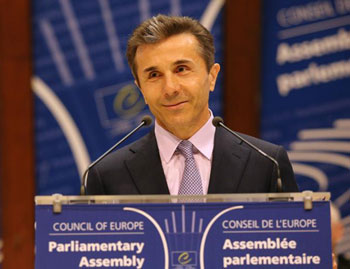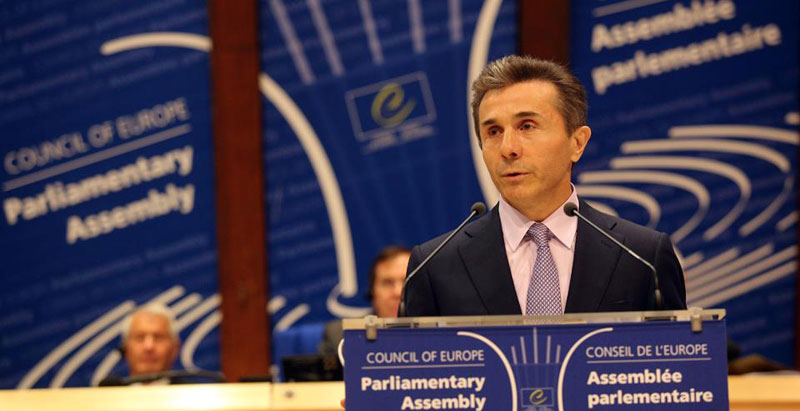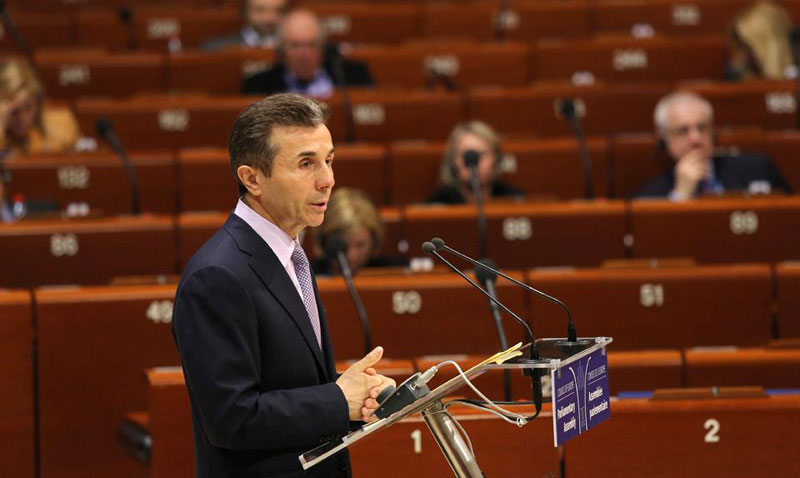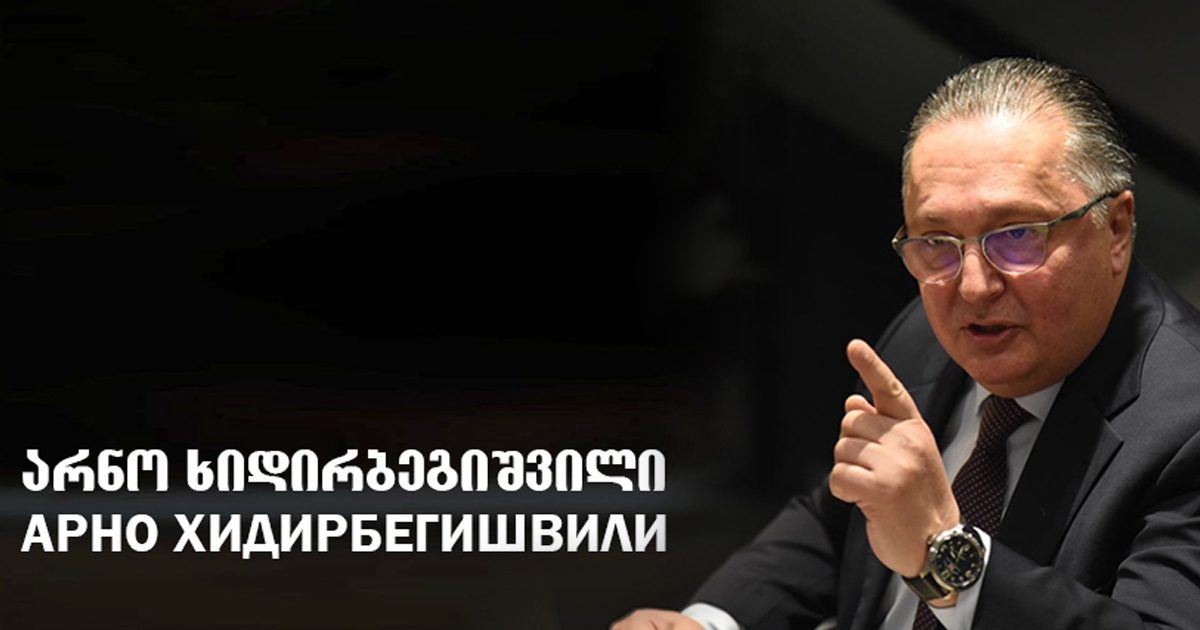 Грузия, 23 апреля, ГРУЗИНФОРМ. Сегодня, в 14:00 ч. по тбилисскому времени, премьер-министр Грузии Бидзина Иванишвили выступил с речью на Парламентской Ассамблее Евросовета в Страсбурге, в которой кратко очертил главные направления и задачи нового правительства Грузии во внутренней и внешней политике страны.
Грузия, 23 апреля, ГРУЗИНФОРМ. Сегодня, в 14:00 ч. по тбилисскому времени, премьер-министр Грузии Бидзина Иванишвили выступил с речью на Парламентской Ассамблее Евросовета в Страсбурге, в которой кратко очертил главные направления и задачи нового правительства Грузии во внутренней и внешней политике страны.
«Monsieur le Président, Mesdames et Messieurs les Députés, Mesdames et Messieurs !
C’est pour la première fois qu’en qualité de Premier Ministre j’ai l’honneur de m’adresser à une institution européenne.
Ce n’est pas un hasard si je me présente devant l’Assemblée Parlementaire du Conseil de l’Europe.
En effet, vous représentez l’imminente institution pour le soutien et la protection d’une véritable démocratie en Europe.
Vous êtes les mieux placés pour savoir que la démocratie ne se construit pas par des effets d’annonce, elle s’obtient par des efforts assidus et une coopération constructive.
Je m’adresse à vous, car vous êtes à mon sens les meilleurs architectes de la démocratie européenne.
Etant à Strasbourg en tant que citoyen français, je ne pouvais pas m’abstenir de m’adresser à vous en français et maintenant je vais continuer en géorgien qui est ma langue maternelle.
You are the living embodiment of Europe’s dream of peaceful cooperation. You not only project a vision. You work hard to make it happen. Through thousands of projects, meetings and consultations each year, you are living the democratic ideal in day-to-day life.
In 1945, there were barely a dozen functioning democracies in Europe. Today 47 countries, home to 800 million people, are joined in the Council of Europe, the world’s oldest and largest body dedicated to the cause of democracy. For many of you, this is an achievement which goes back many decades. The exhausted continent of 1949 has become the most prosperous region on earth.
Georgia became the 41st member of the COE in 1999.
To my country, it is still a thrill to be here amongst you. We have come late to the club of freedom, and we know we still have a long way to go. The election that brought my government power in October 2012, represented the precedent of the democratic transfer of power in my country.
That is why I feel a huge sense of responsibility addressing you. I know that we are inexperienced with the practice of democracy. As we debate issues with our opponents at home, I can feel how hard it is for us sometimes to pull back from disputes and place our trust in the good will of the other side. Naturally, it would not be easy for you to relate to this.
Challenges that Georgia faces today can be explained as follows. Our history has been difficult. We live today in a difficult neighbourhood. Many challenges of a globalized world are facing us. That is why we need your help. We need the support of the many institutions of the Council of Europe to help guide us through this transition.
While continuing that part of the reforms from the previous government, instituted during first years in power, which have been for the benefit of the country, we must also replace the authoritarian structures of his later years with a modern, civil society.
In the recent years practically all fields were controlled by the ruling elite in Georgia, while the basic law of the country – the constitution – was abused, being practically tailored to serve one man’s ambitions. Elite corruption made no room whatsoever for businesses to develop. Human rights were ignored. Pressure was deployed upon not only those holding different views, but their families and acquaintances as well. The media were mostly under control.
We have also begun a healing process, which channels deep anger and restores a sense of self-respect to our citizens. That includes indictments of some former officials for past crimes. But it also includes keeping the thousands of loyal civil servants who have served the previous government.
This is why we work hard to ensure that our policies are fully transparent. We facilitate the work of the Western press and NGO’s in Georgia. We hope for as many visits by parliamentary delegations as can be arranged.
At my request, the EU has appointed Thomas Hammarberg, the former Council of Europe High Commissioner on Human Rights, as a Special Advisor for Legal and Constitutional Reform and Human Rights in Georgia. Observers from the OSCE and other inter-governmental and non-governmental organizations will monitor all investigations, prosecutions and trials of former government officials to ensure that they comply with international norms.
Our Justice Minister, Ms. Tea Tsulukiani is a veteran of the European Court of Human Rights and the list of COE bodies with which we cooperate is long. We are especially grateful to the leaders of the Venice process who are helping with judicial reform. We appreciate the debates in the Parliamentary Assembly as example for our own practices at home. We are working in many agencies and committees of the COE to ensure that we meet the standards of this organization. We working in particular on issues of minority rights which will help us transition to a new stage in ongoing relations with the COE.
This ongoing cooperation will be pursued with the greatest energy. But our democratic vision – our dream - for Georgia goes beyond these important details. I have read the history of the European movement carefully. I understand that building a united Europe was above all a project of peace.
Looking back over the past century, one can see how recurring warfare was especially disastrous for small countries caught up in conflicts not of their making. Europe was once a battlefield where small countries were fighting and killing each other. The award of the 2012 Nobel Peace Prize to the European Union was in recognition of the historic achievement of Europe in building peace.
As you all know, however, warfare has not been overcome completely. Small countries, in particular, continue to suffer from aggression. The clear example to that is my home country. Twenty percent of our territory was occupied by Russia in 2008. There are other conflicts that endanger the peace in our region. I have to say that the Caucasus is yet not a zone of peace.
A special challenge will be to build relationships with our largest neighbour, Russia. With new pragmatic approach, we started bilateral dialogue with Russia. We are returning Georgian products to the Russian market. I can assure you that our position in relations with Russia will be correct and yet principled. The appointment of my special representative for relations with Russia clearly demonstrates that we are willing to turn the page in dialogue.
We both have our own red lines, which neither of us intends to cross. In 2010, Georgia unilaterally pledged non-use of force in conflict resolution process. This pledge was endorsed by the Parliament’s resolution on March7, 2013. The format of Geneva negotiations established after the August 2008 war represents the only international format where Georgian and Russian diplomats hold negotiation with the participation of international mediators.
In this challenging process, Georgia needs international engagement and support more than ever. The newly started dialogue between Tbilisi and Moscow should not create an impression, that Georgia is dealing with this problem on its own and no longer is in need of European partners support.
We will be realistic about Georgia's possibilities. We will recognize that Georgia is a small regional power in a volatile neighborhood. No sustainable future can be built by projecting military power. But there can be no progress towards peace in the region if Georgia is expected to abandon its legitimate interests, especially territorial integrity and the right of its citizens to return to their homelands.
Regulation of these relations will benefit not only Georgia but Caucasus in general as well. Our intention is to use the tools of civil society to help build peace in our region. Above all, we will focus on democracy as we believe that security, unity and prosperity of Georgia largely depends on the quality of your democracy.
I would like to emphasize that Georgia’s western aspirations – Euro-Atlantic integration – represent our strategic choice that has no alternative. This choice was made by the Georgian people long ago.
Georgia’s decision to apply for membership in NATO represents above all a deep commitment among our people to live the values of the West. This commitment was echoed in the Resolution on Basic Directions of Georgia’s Foreign Policy, unanimously adopted by the Georgian Parliament.
Herewith, I would like to touch on current and planned developments in the country. The government is working actively on the employment policy. In this regard, we are improving the Labor Code to meet European standards to the fullest extent possible. I believe that the state should play a decisive role in the development of business and provide this field with development guarantees. Today business is free from political pressure, and soon we will see concrete, positive results in terms of growth of investments.
We have already based utility rates on realistic calculations and established fair rates. Cooperation and negotiations with our partners continue in this regard.
The Georgian Government is implementing a large-scale agricultural reform, which is unprecedented for the country. A vital healthcare reform is also underway. The universal healthcare program has already been launched. At the following stage of this program, all citizens of Georgia will enjoy the benefits of the state universal medical insurance package, and this system will improve even further in the future. Building a country upon democratic values is impossible without free media. The journalist must be first to criticize the government and therefore provide society with objective information. Our government is absolutely open to media representatives and their objective appraisal and criticism will benefit our work tremendously.
Reform of the judiciary is the cornerstone at insuring genuine democratic processes in the country. The initiated reform is based on the recommendations of the local civil society organizations and reflects comments from the Venice Commission and Georgian Judicial branch. I believe Georgia has a unique chance to establish a truly independent judicial system, free from the executive branch and free from the political influence and the government of Georgia is aimed at not to miss this chance.
The government pays special attention to the integration of ethnic minorities in Georgian society, so that they may feel at home in Georgia. We will remain to be a country where different confessions coexisted for centuries.
Empowerment of local self-governments is one of preconditions for their integration in Georgian society. You will be aware of the highly emotional background in local self-government bodies following the October election. Throughout the years, the public at large has witnessed one political force dominate all levels of government, and to this day society finds it difficult to comprehend a new reality when different political forces are decision makers at different levels.
The replacement on national level of the previously dominating political force instilled a sense among the local population that a similar replacement of that force was inevitable in local self-governments. There is also an unfortunate tradition that local officials in the regions change their party belonging in favor of the ruling party on such situations. Also this time, a number of actions in this context soon became chaotic and even exceeded legal boundaries in some cases.
The Georgian Government is committed to the constitutional principles of separation of powers, including the independence of local self-government bodies. At the same time, as a ruling political team, we are obliged to address adequately violations of law. I would like to emphasize that the Georgian Government and law enforcements will deploy legally stipulated measures to address all instances of use of force, pressure, or intimidation, should such instances occur.
Mr. President, as we enter our sixth month in office, the Georgian Dream coalition has already established a solid record of achievement. Our program to build civil society is well underway, the economy is returning to a solid foundation, recent polls show that the voters are increasingly supportive to their government, we are making steady progress towards Euro-Atlantic integration and there have even been a few small steps forward in relations with Russia.
Perhaps most encouraging is the fact that after a rough beginning, we are starting to apply lessons from the Council of Europe on how to build consensus with former adversaries.
I am confident that Georgia has finally turned the corner. Our election victory in October was an important next step towards sustainable democracy. Success at this task will be of great importance to the Georgia people. I am certain also that it will help us make an important contribution to the project for peace, which is the underlying foundation of the European ideal.»
 |
 |
.jpg)
























